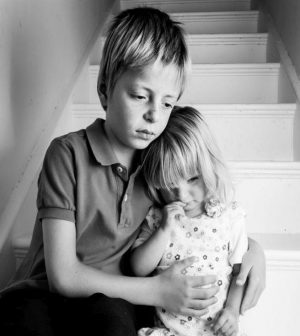- Could Your Grocery Store Meat Be Causing Recurring UTIs?
- Are You Making This Expensive Thermostat Error This Winter?
- Recognizing the Signs of Hypothyroidism
- 10 Strategies to Overcome Insomnia
- Could Artificial Sweeteners Be Aging the Brain Faster?
- Techniques for Soothing Your Nervous System
- Does the Water in Your House Smell Funny? Here’s Why
- Can a Daily Dose of Apple Cider Vinegar Actually Aid Weight Loss?
- 6 Health Beverages That Can Actually Spike Your Blood Sugar
- Treatment Options for Social Anxiety Disorder
Childhood Trauma Could Raise Odds for Adult Physical Pain

Beyond a myriad of other consequences, childhood trauma appears to raise the specter of chronic pain in adulthood, new research shows.
Researchers pored over 75 years’ worth of data involving more than 826,000 people. That included information on levels of neglect or physical, emotional or sexual abuse, plus other serious trauma of childhood.
Their review found strong links between a history of childhood physical abuse, especially, and chronic pain conditions decades later. But other forms of “adverse childhood experiences” (ACEs) appeared linked, too.
“These results are extremely concerning, particularly as over 1 billion children – half of the global child population – are exposed to ACEs each year, putting them at increased risk of chronic pain and disability later in life,” said study lead author André Bussières, an assistant professor of physical and occupational therapy at McGill University in Montreal, Canada.
The findings — based on data from 57 studies — were published Dec. 19 in the European Journal of Psychotraumatology.
Besides various forms of abuse, other trauma included in the new analysis involved domestic violence, living with a family member who has substance abuse, or the loss of a parent.
Conditions of adult chronic pain in the study included low back pain, arthritis, headache and migraine, often severe enough to interfere with daily living.
Overall, kids exposed directly to neglect or physical, sexual or emotional abuse were 45% more apt to suffer a chronic pain condition as an adult, compared to those without such exposures, Bussières’ team found.
Physical abuse had the biggest impact, being linked to both chronic pain and pain so bad it led to real disability.
Adding in “indirect” trauma — things like domestic violence, a parent’s substance abuse or parental loss — upped the odds for chronic pain further, the study found.
Bussières said in a journal news release that all of this shows that there’s “an urgent need to develop targeted interventions and support systems to break the cycle of adversity and improve long-term health outcomes for those individuals who have been exposed to childhood trauma.”
His team is convinced more needs to be done to understand why a person who has suffered childhood trauma is at higher risk for adult physical pain. A better understanding of the link might also lead to new and better ways to help prevent these longer-term outcomes, researchers said.
More information
Find out more about chronic pain at Johns Hopkins Medicine.
SOURCE: Taylor & Francis Group, news release, Dec. 19, 2023
Source: HealthDay
Copyright © 2026 HealthDay. All rights reserved.










